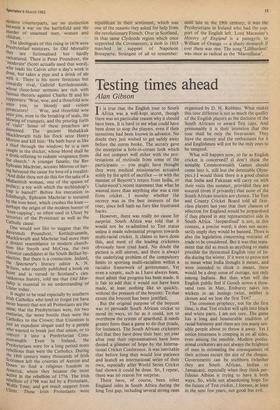Testing times ahead
Alan Gibson
It is true that the English tour to South Africa was a well-kept secret, though there was no particular reason why it should have been. It is hard to see what could have been done to stop the players, even if their intentions had been known in advance. No doubt they just wished to get safely away before the storm broke. The secrecy gave the enterprise a hole-in-corner look which did not comport well either with the pro- testations of rectitude from some of the participants — you might have thought they were medical missionaries actuated solely by the spirit of sacrifice — or with the manner of Boycott's return from India, or Underwood's recent statement that what he wanted more than anything else was a rest from cricket. 1 wonder whether the secrecy was in the best interests of the tour, since hell hath no fury like frustrated hacks.
However, there was really no cause for surprise. South Africa was told that it would not be re-admitted to Test status unless it made substantial progress towards multi-racial cricket. It claims to have done this, and most of the leading cricketers obviously have tried hard. No doubt the picture is still uneven, and there is always the underlying problem of the compulsory limits to sporting multi-racialism within a racialist framework of government. Yet even a sceptic, such as I have always been, must admit that progress has been made. It is fair to add that it would not have been made, at least nothing like so quickly, without the pressure of the boycott. To that extent the boycott has been justified.
But the original purpose of the boycott was to persuade South African cricket to mend its ways, so far as it could, not to overthrow the system of apartheid. It needs greater fores than a game to do that (trade, for instance). The South African cricketers feel that they have done their best: yet year after year their representatives have been denied a glimmer of hope by the Interna- tional Cricket Conference. It was inevitable that before long they would lose patience and launch an international series of their own, especially after World Series Cricket had shown it could be done. So, I repeat, there was no reason for surprise.
There have, of course, been other England sides in South Africa during the long Test gap, including several strong ones organised by D. H. Robbins. What makes this tour different is not so much the quality of the English players as the decision of the South Africans to award Test caps. And presumably it is their intention that this tour shall be only the forerunner. They have the money and the enthusiasm for it and Englishmen will not be the only ones to be tempted.
What will happen now, so far as English cricket is concerned? (I don't think the amiable ComMonwealth Games should come into it, still less the detestable Olym- pics.) I would think there is a good chance that India and Pakistan will carry on with their visits this summer, provided they are assured (even if privately) that none of the South African tourists are chosen. The Test and County Cricket Board told all first- class players last year that their chances of selection for England would be jeopardised if they played in any representative side in South Africa. 'Jeopardised' is not, in this context, a precise word; it does not neces- sarily imply they would be banned. There is also the legislation concerning restraint of trade to be considered. But it was that state- ment that did as much as anything to make possible the threatened English tour of In- dia during the winter. If it were to prove not to mean what India thought it meant, and were intended to think it meant, there would be a deep sense of outrage, not only among Indians. But then what will the English public feel if Gooch scores a thou- sand runs in May, Emburey takes ten wickets in an innings twice, neither is chosen and we lose the first Test?
The common prophecy, not for the first time, is that Test cricket will split into black and white parts. I am not sure. The game has a long and honourable tradition of racial harmony and there are too many sen- sible people about to throw it away. Yet I notice bitterness is creeping in on all sides, even among the sensible. Modern profes- sional cricketers are not always the brightest of men in estimating the consequences of their actions except the size of the cheque. Governments can be stubborn (whether they are South African, Indian or Jamaican), especially when they think per- fidious Albion is trying to have it both ways. So, while not abandoning hope for the future of Test cricket, I foresee, at least in the next few years, not good but evil.






































 Previous page
Previous page